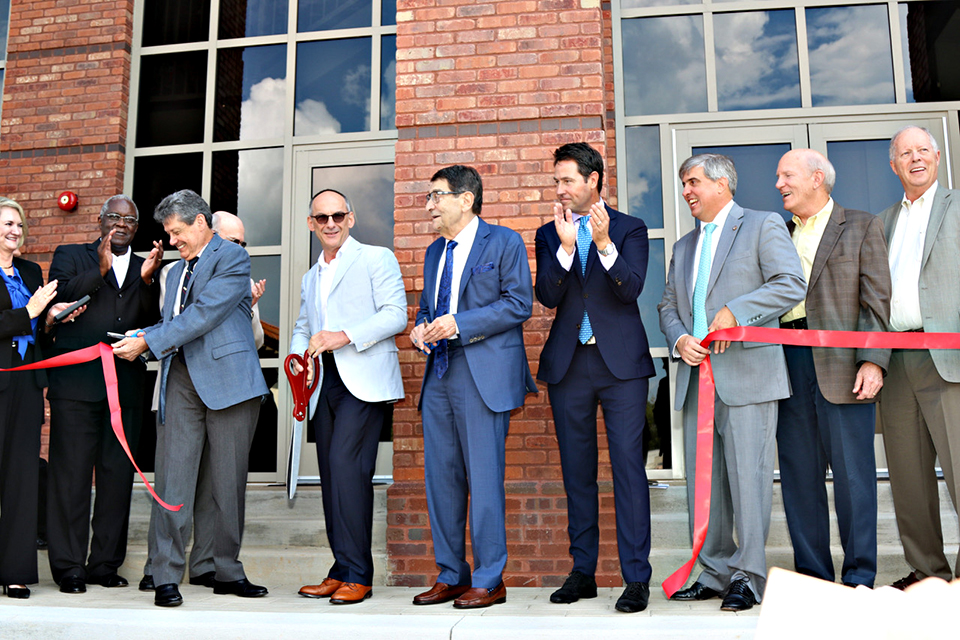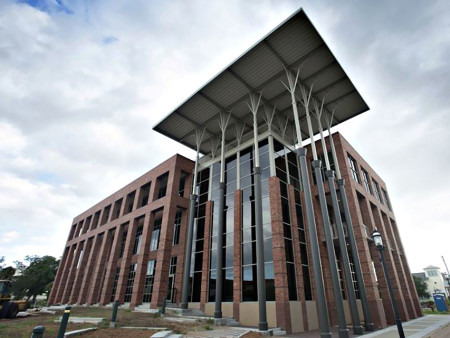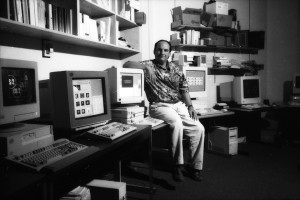EntreCon 2016: How Ken Ford charted the course for IHMC
- October 25, 2016
- / Randy Hammer
- / training-development

Dr. Ken Ford, center left in sunglasses, benefactor Fred Levin, and other dignitaries at the dedication for The Levin Center for IHMC Research in September 2016.
“I think this is going to be big,” said Morris Marx.
It was sometime in the ‘90s when Marx, who was the president of the University of West Florida back then, walked me across campus to introduce me to Ken Ford, whose office was in the back of the campus computer center and wasn’t much bigger than a storage room.
“You’ll want to keep on eye on these guys,” said Marx.

The new $8 million facility that will house the researchers and work being done by the Institute for Human and Machine Cognition will draw top talent to Pensacola. Credit: Pensacola News Journal.
Those guys were Ford and Alberto Canas. And that storage room in the back of the computer center was called the Institute for Human and Machine Cognition. As of last month, that institute now resides in a new $8 million facility.
I called Marx after Ford and other dignitaries cut the ribbon on the institute’s new three-story, 30,000- square-foot research center.
“To be honest, I didn’t think IHMC was going to be this big,” said Marx as he laughed.
Ford and Quint Studer are two of the most prominent entrepreneurs to emerge from Pensacola. Studer rose on the private side; Ford on the nonprofit, academic side.
Studer built a health-care consulting company in the late ‘90s that started with just two employees — he and his wife Rishy — and now employs more than 250 people. Ford built a nonprofit research institute that started in the ‘90s with just two UWF faculty members and now employees 120 people.
Studer and Ford will share some of the strategies that led to their success at EntreCon, the Studer Community Institute’s annual two-day conference featuring more than 40 speakers and panelists that is set for Nov. 3 and 4 in downtown Pensacola.
Whether you’re on the private side or the nonprofit side, Marx says there are good lessons to be learned from the way Ford took an idea and built it into an organization that now has contracts with the National Science Foundation, the U.S. Department of Defense, the Army, Navy, Air Force, NASA and others.
“I had a lot of good ideas presented to me when I was president at the university,” said Marx. “But some weren’t feasible and some cost too much money. Ken just made an outstanding case of what the course of computer science was going to be like and his version of how that related to cognition.”

Dr. Ken Ford, founder of the Florida Institute for Human and Machine Cognition, back in the institute's early days.
Marx said he had worked for a little while at IBM and had some background in computers. But when Ken pitched his idea, he didn’t overwhelm Marx with a grand vision of the future.
“Instead, he explained how we could build the institute incrementally. And everything Ken told me he could do, he did. And then he would say, 'This is what we can do next,' and he would do it. He did a great job of laying out the steps he was going to take and then he would do them, and the institute took off.”
Eventually the state legislature moved the institute into the State University System and renamed it the Florida Institute for Human and Machine Cognition. Today, IHMC is a world leader in pioneering technologies that are aimed at leveraging and extending human performance.
IHMC’s scientists and engineers are national and world leaders in artificial intelligence, robotics, assistive technologies, natural language understanding, human performance optimization, and other related high-tech fields.
One of Ford’s greatest achievements has been his ability to attract world-class talent to come work in Pensacola. His talk at EntreCon will focus on the challenges of attracting talent and ways to create innovative work environments that allow organizations to compete in today’s competitive global market.
Ford has certainly figured out how to do that over the years.
Florida has six fellows with the Association for the Advancement of Artificial Intelligence. They all work for IHMC. Last year, IHMC won second place in the international DARPA Robotics Challenge and was the top team from the U.S. Recently, IHMC placed second in the international Cybathlon Competition, an event geared toward helping disabled athletes use bionic technology ranging from robotic prostheses to brain-computer interfaces.
Escambia County Commission Chairman Grover Robinson did an excellent job of describing the impact IHMC has had on the community during the recent ribbon-cutting ceremonies of the institute’s new $8 million Levin Center for IHMC research.
Because of IHMC, Robinson said, “Some of the leading minds, not just in the nation, but in the world, are coming here to Pensacola.”
The other day I reminded Marx about the day he walked me across campus to meet Ken and visit him in his storage room of an office.
Marx laughed. “Like I said, I sure didn’t see the institute becoming this big. But I certainly have enjoyed seeing all the magic Ken has created over the years.”

 CivicCon launches with a look at good growth in cities
CivicCon launches with a look at good growth in cities
 Building stronger brains one baby, one parent at a time
Building stronger brains one baby, one parent at a time
 SCI debuts commercial on Early Learning City
SCI debuts commercial on Early Learning City
 Entrecon: World class speakers and an opportunity to sharpen skills
Entrecon: World class speakers and an opportunity to sharpen skills
 PYP Quality of Life survey 2017
PYP Quality of Life survey 2017
 EntreCon Pensacola 2016: A look back
EntreCon Pensacola 2016: A look back
 Leadership tip: getting better employee takeaways
Leadership tip: getting better employee takeaways
 Leadership tip: be interested instead of interesting
Leadership tip: be interested instead of interesting
 Leadership tip: delivering difficult messages
Leadership tip: delivering difficult messages
 Brain Bags boost Arc, Early Childhood Court programs
Brain Bags boost Arc, Early Childhood Court programs